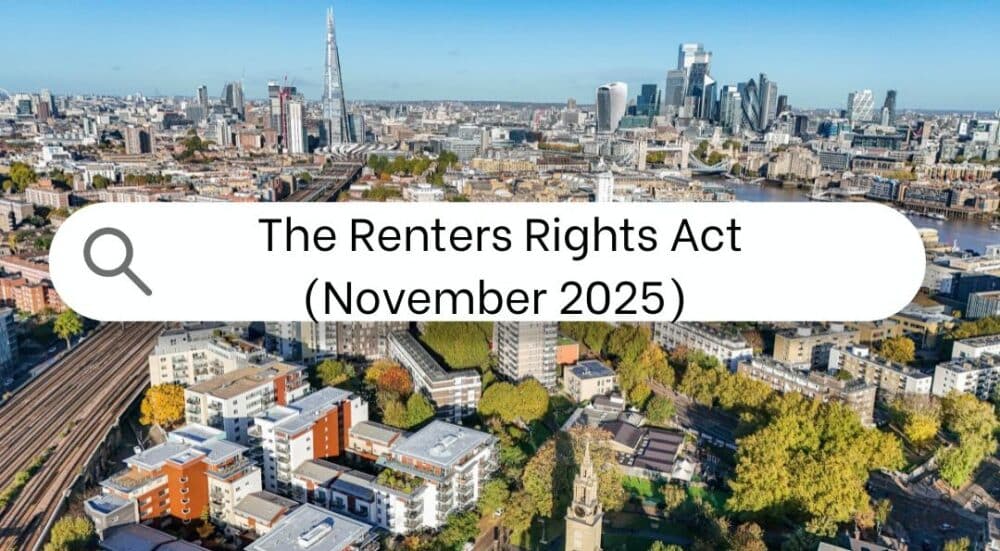
The Renters Right Act
The Renters’ Rights Act 2025 has now become law, marking the most significant overhaul of the private rented sector in England for more than three decades. It builds on what was originally known as the Renters’ Reform Bill and aims to deliver a fairer balance between landlords and tenants.
For those renting or letting homes in SE16 and across South East London, the changes will gradually reshape how tenancies are managed, agreed and ended. Although not every measure has yet come into effect, understanding what is confirmed will help both landlords and tenants prepare confidently for the months ahead.
The Renters’ Rights Act received Royal Assent in October 2025 after an extended passage through Parliament. The Government has confirmed that the first set of provisions will come into force in stages during late 2025 and 2026, allowing time for landlords, letting agents and tenants to adapt.
While the headlines have focused on the end of Section 21 “no-fault” evictions, the Act introduces a far wider package of reforms designed to raise standards, strengthen rights and promote long-term, stable renting.
Under the new law, landlords will no longer be able to evict tenants using Section 21 notices. Instead, possession must be sought through Section 8 grounds, which specify valid reasons such as wanting to sell or move back into the property, serious rent arrears, or proven anti-social behaviour.
At the same time, the traditional fixed-term tenancy will disappear. All new Assured Shorthold Tenancies now automatically convert into open-ended periodic tenancies, continuing indefinitely until either party gives proper notice. Tenants must provide at least two months’ written notice if they wish to leave, while landlords must meet the required legal grounds before ending an agreement.
This shift is intended to give tenants greater security and make renting more predictable, while still preserving landlords’ rights to reclaim their property under fair and transparent conditions.
The Act introduces stricter rules on how and when rent can be raised. Landlords may now increase rent only once every twelve months, and they must give tenants at least two months’ notice using a Section 13 notice.
Tenants who believe a proposed rent is above the local market level can challenge it at the First-Tier Tribunal, which has the power to reduce it if necessary.
Another key change is the ban on rent bidding. Landlords and agents can no longer ask for or accept offers above the advertised rent. Every property must display a clear asking price, helping tenants to budget and reducing competitive bidding wars that often disadvantage lower-income renters in London’s more expensive areas.
To make moving home more affordable, the Act limits rent in advance to a maximum of one month. Any attempt to collect multiple months up front will count as a prohibited payment under the Tenant Fees Act.
Deposits must still be protected in a government-approved scheme, and landlords who fail to register them will lose the ability to regain possession through the courts until the issue is corrected.
A balanced approach to pet ownership has also been confirmed. Tenants now have the right to request permission to keep a pet, and landlords must respond within twenty-eight days. A refusal must be reasonable and supported by evidence, for example if keeping the pet would breach a head-lease clause or risk damage to the property.
Tenants can escalate disputes to the new Private Rented Sector Ombudsman if they feel a refusal has been unfair.
One of the most welcome parts of the Act is the introduction of stronger anti-discrimination rules. It is now unlawful to refuse an applicant simply because they receive benefits or have children.
Clauses in mortgages or insurance policies that previously restricted these groups are no longer enforceable. Landlords and agents can still carry out affordability checks, but decisions must be based on financial evidence rather than personal status.
This measure is expected to improve fairness and widen access to rental homes across the capital.
The Act extends the Decent Homes Standard to private rentals, meaning all homes must be safe, well-maintained and free from serious hazards such as damp, mould or unsafe electrics.
Landlords must also register each property on a new Private Rented Sector Database and join an approved Landlord Ombudsman Scheme. This database is designed not just for enforcement but also to support landlords with guidance and transparency.
Failure to register could lead to financial penalties and restrictions on letting in the future.
Although the Act is now law, its provisions will be phased in. Early regulations expected by December 2025 will focus on the database and ombudsman setup, while the tenancy and rent-related reforms will follow in 2026.
Landlords are encouraged to review existing tenancy agreements and consider how future lettings can transition smoothly. Tenants, meanwhile, should familiarise themselves with their new rights and the proper notice procedures before ending an existing tenancy.
For London landlords, these reforms highlight the importance of professional management and clear communication. Working with accredited letting agents will ensure compliance with evolving legal requirements and protect both income and reputation.
For tenants, the Act promises longer-term stability and improved housing standards, especially welcome in areas like SE16 where rental demand remains high.
Ultimately, the success of these changes depends on cooperation between landlords, tenants and agents. Understanding the detail now will help everyone adjust smoothly when the next stages of implementation begin.
At Alex & Matteo Estate Agents, we stay ahead of legislative updates to provide accurate guidance for landlords and tenants across Bermondsey, Rotherhithe, Canada Water, Surrey Quays and the wider SE16 area.
If you have questions about how the Renters’ Rights Act affects your current or future tenancy, our expert lettings team is here to help. Contact us today for practical, up-to-date advice on managing property under the new rules.
